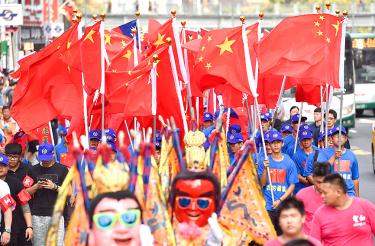The US-China Economic and Security Review Commission on Wednesday published its annual report, in which it quoted Victims of Communism Memorial Foundation research fellow Peter Mattis as saying that Beijing’s aim is to create “a ‘fake civil society’ that can be used against Taiwan’s democratic system.”
Mattis’ remarks were made in an article written in August last year in which he cited interlocutors, the commission, which was established by the US Congress in 2000, said in its report.
Beijing’s political warfare against Taiwan has included not only “military modernization and intimidation,” but also support for opposition parties and the spread of disinformation, it said.
These tactics seek to build “alliances” between the Chinese Communist Party (CCP) and groups in Taiwan, it said.
They undermine President Tsai Ing-wen’s (蔡英文) administration and Taiwan’s democracy, it added.
The report also said that Mattis’ discussions with people in Taiwan had led him to believe that “covert Chinese activities have increased in scope, sophistication and intensity.”
“For the first time in many years, Taiwan’s national security officials see change rather than continuity as a hallmark of Beijing’s intelligence and subversive operations,” the report quoted Mattis as saying.
In the report, the Washington-based commission also cited Global Taiwan Institute executive director Russell Hsiao (蕭良淇) as saying that Beijing’s “united front” strategy targets “10 constituencies.”
Those constituencies are “grass-roots villages, youth, students, Chinese spouses, Aborigines, pro-China political parties and groups, religious organizations, distant relatives, fishermen’s associations and retired generals,” the report said.
The commission also outlined some of the measures the government has taken to combat Chinese interference.
The National Security Bureau in 2015 established a big data and public opinion task force that works with the Ministry of Justice to monitor misinformation, “especially false news stories from [China] that aim to manipulate public opinion in Taiwan,” the report said.
The government has also dedicated pages on its various Web sites to clarifying rumors and false information, and is investigating connections between Beijing and specific groups in Taiwan, it added.
Tsai, who doubles as Democratic Progressive Party (DPP) chairperson, said on Facebook on Wednesday that there is no reason to be optimistic about the nine-in-one elections, as there are forces trying to suppress the nation’s democracy through “dirty tricks,” such as disinformation.
“Some people believe that if they talk about false information loud enough, it will become real. We must not let this kind of dirty trick prevail,” Tsai said, citing as an example false news reports that DPP Kaohsiung mayoral candidate Chen Chi-mai (陳其邁) cheated during a debate on Saturday last week by wearing an earpiece.
Source: Taipei Times - 2018/11/16





















